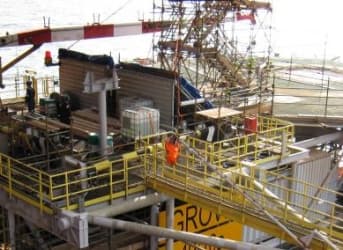The oil industry’s next big innovation has largely been over-shadowed by the collapse of oil prices. But this new technology promises to have a bigger long-term impact on the energy industry than any short term production decisions made by OPEC. And this new technology may just change the face of employment for thousands of workers around the world too. Related: Media Spin On Oil Prices Running Out Of Fuel
For a long time, offshore oil platforms have provided a good living for experienced workers in a variety of roles in the oil field. After taking into account rotation schedules, there are roughly 100-200 employees on an oil rig depending on a variety of factors. The average wage for these employees is approximately $50,000 per year. Putting these figures together, the average personnel cost for an offshore rig is $5-10M per year. For a well that produces ~2,500 barrels of oil a day, this personnel cost works out to the equivalent of $5-$10 per barrel of oil. Unsurprisingly, producers are eager to lower these costs in any way they can. And an emerging technology offers a sea-change to the current status quo.
The new technology in question is the unmanned offshore oil platform. Building on decades of advances in robotics, offshore oil platforms look set to become one of the next industrial applications to replace workers with machinery. Driverless cars may be getting a lot more press, but in recent months there have been several announcements about major oil firms adopting unmanned offshore platforms. This technology is already proven and has been available for years, but it appears the current turmoil in energy markets may be driving the majors to adopt unmanned platforms as a cost cutting measure. When times were good and oil prices were high, companies didn’t feel much incentive to take actions that could prove unpopular with employees. But now companies are putting all options on the table. Related: Oil Rebound May Come Sooner Than Expected
There are several firms that have looked to develop technology that can reduce headcounts and costs in oil extraction. As the technology becomes more widely used, it is likely to become cheaper and this, in turn, will lead to still further adoption, creating a virtuous cycle in the industry. Over the long run, one by-product of this technology may be considerably lower employment levels in the oil extraction business. Just as robots appear to be gearing up to change the face of manufacturing in the US and other industrialized nations the energy industry will not be immune. Related: What If An Oil Rebound Never Comes?
What does this mean for the country as a whole? Employee costs are substantial for oil extraction so any successful efforts to reduce headcount will also reduce production costs and enable more production at lower price levels. $5-10 a barrel in costs makes a big difference to the bottom line. This cost reduction is beneficial for all consumers. Similarly, any cost benefits that do not get passed onto consumers will buoy producer profits and help boost stock prices. Unfortunately, these benefits come at a cost.
Workers who once could earn a good living in the energy business may have to find other occupations. While society as a whole is better off when resources are produced more efficiently, that improvement is not free. The current trend towards unmanned offshore oil platforms does nothing to undermine that fundamental truth, and the industry will have to decide how to handle this truth.
By Michael McDonald for Oilprice.com
More Top Reads From Oilprice.com:
- Finally Some Good News For Oil Prices
- Many Big Guns Still Betting On Oil Comeback In 2015
- Oilfield Services Facing Years Of Decline


















